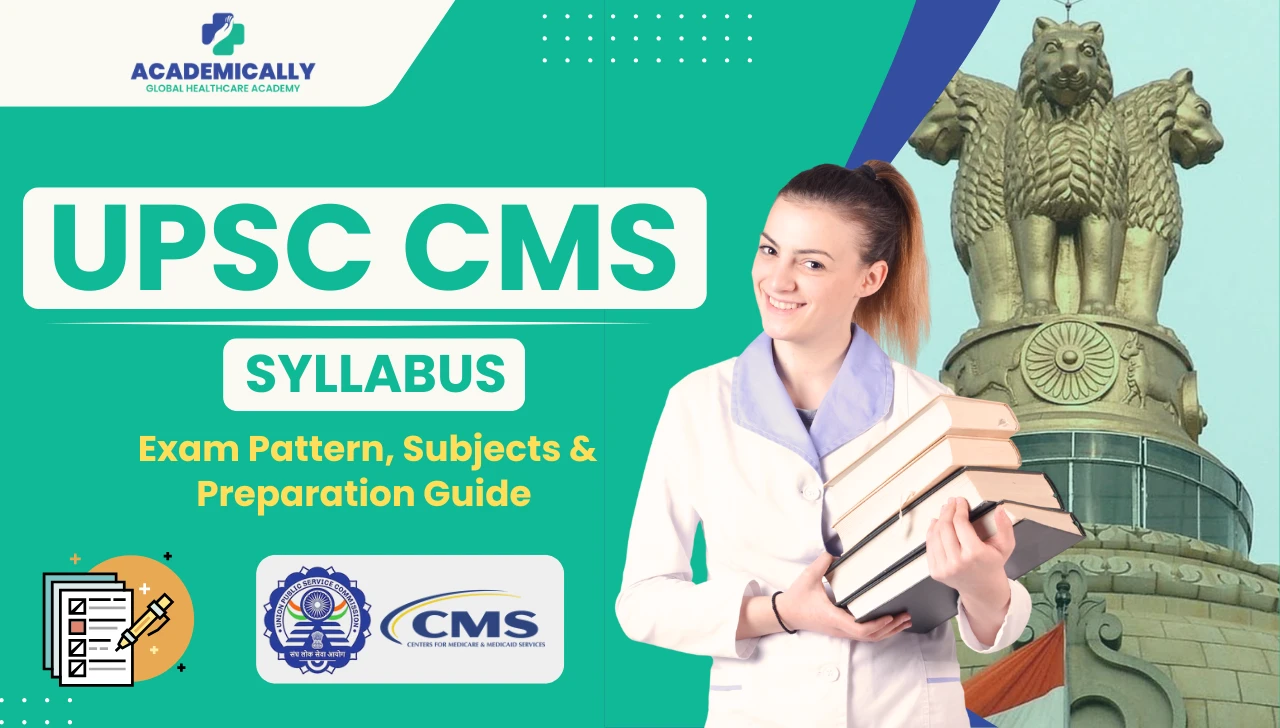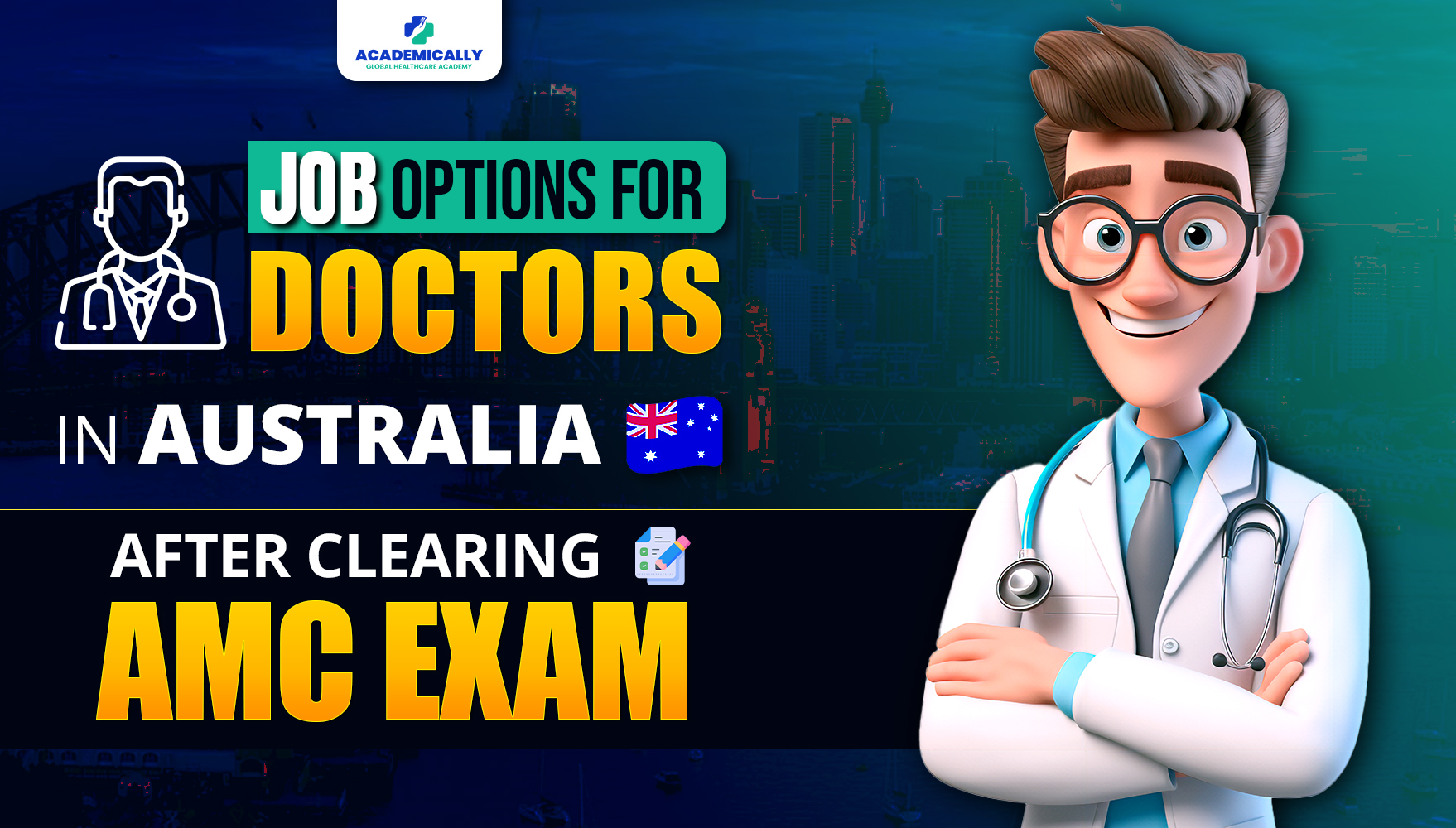Most people get into the field of medicine with the aim of helping people. However, in our country, a freshly graduated doctor needs to invest years before their career stabilises. What if I tell you that you can get all the benefits and stability of a government job after your MBBS? You read that right. The UPSC CMS is a call for all medical graduates who want to serve the nation.
This is the UPSC Combined Medical Services exam that is conducted by the government to recruit doctors into various central government medical posts. Now, before you start with your preparation, it is important to understand the exam.
In this blog we are going to break it down for you, from the exam pattern to the syllabus. And what’s even more important, we have a super-effective preparation guide.
Let us start.
The UPSC CMS Exam
Before we get into the exam details, here is a quick overview of the exam itself.
| Exam Particulars | Details |
| Exam Name | UPSC Combined Medical Services Exam |
| Conducting Body | Union Public Service Commission (UPSC) |
| Level | National |
| Eligibility | MBBS Graduates |
| Exam Mode | Computer-Based Test (CBT) |
| Selection Stages | Written Exam and Personality Test/Interview |
| Official Website |
UPSC CMS Exam Pattern
UPSC CMS Exam is a two-stage selection process. The first part is the written exam, and the second part is the interview.
Part 1: Written Exam
The exam is a computer-based, online exam. It has objective, multiple-choice questions. The written exam is divided into two sections. Both sections are of 250 marks each, making the written exam of 500 marks total. Each section is of 2 hours duration.
Here is a breakdown of the two papers:
Paper I
Maximum Marks: 250
Paper II
Maximum Marks: 250
The marking scheme for the test is similar to other competitive exams. You should also be aware that there is negative marking. Each incorrect answer carries 1/3rd negative marks. And if you select more than one answer, that is also considered as an incorrect response.
Candidates who qualify in the written examination are called for an Interview/Personality Test.
Part 2: Interview/ Personality Test
The Personality Test carries 100 marks. It is conducted for those candidates who qualify for the written examination.
Now that the exam pattern is clear, let us get into what exactly the syllabus is.
Combined Medical Services Exam Syllabus
The syllabus for the exam covers everything you have studied in your MBBS. So, there are no surprises here.
Here is a breakdown of the questions you can expect from the written exam, combining both Part 1 and 2.
| Subject | Questions |
| Part 1 | |
| General Medicine | 96 |
| Paediatrics | 24 |
| Part 2 | |
| Surgery (including ENT, Ophthalmology, Traumatology and Orthopaedics) | 40 |
| Gynaecology and Obstetrics | 40 |
| Preventive and Social Medicine | 40 |
Preparation Guide to Ace UPSC CMS
Here’s the 8-step plan to get you exam-ready. Think of it as your training montage to becoming a government-appointed life-saviour.
Step 1: Understand the Syllabus
Go through past notifications and syllabus details on UPSC’s website. Having the official full list helps avoid wasting effort on irrelevant topics.
Step 2: Break the Subjects Into Chunks
Example:
- Medicine → Split by systems (cardio, respiratory, GI, neuro)
- Surgery → Split similarly (general and specialties)
- Paediatrics → newborn, child health, infectious diseases
- Gynaecology/Obstetrics → antenatal, intrapartum, postpartum, gynae problems
- PSM → epidemiology, Biostatistics, health programmes in India
Step 3: Make A Timetable
- Allocate time weekly for each subject. For example:
- Medicine- 4 days
- PSM- 2 days
- Surgery- 3 days
- Include revision blocks.
- Add mock test slots every 2-3 weeks, to simulate exam conditions.
Step 4: Master Your Core Textbooks
- Pick standard sources like the expert recommended MBBS textbooks.
- Make your notes crisp.
- Use flow-charts, diagrams, and tabulated comparisons to speed recall.
Step 5: Focus On High-Yield and Dynamic Topics
- For PSM:
- National health programmes
- Epidemiology
- For Surgery/Gynae
- High incidence problems
- Newer guidelines
- For Medicine/Paediatrics
- Prevalent conditions in India
- Public health relevance
Step 6: Practice With MCQs and Previous Year’s Papers
- Since the written exam is an objective type, you’ll benefit from high-volume MCQ practice.
- You can improve your accuracy as well as speed.
- It also helps to build confidence.
- Don’t skip negative marking.
Step 7: Interview/Personality Test Prep
- Brush up on your subject and recent health policy changes.
- Practice communication, body language, and clarity of thought.
- Mock interviews help you with confidence.
Step 8: Revision and Self-care
- Practice intensive revision of all subjects at least one month before the exam.
- Use quick-recall sheets and take timed mock tests..
- Ensure proper sleep, exercise, and mental breaks. A sharp mind handles the unexpected.
Quick Hacks and Smart Tips
- Make “one-page cheat sheets” for each major subject: key numbers, algorithms, differential diagnosis tables, health programmes.
- Use active recall
- Use spaced repetition for tough topics
- In MCQs, if unsure, eliminate obviously wrong options. Then pick the best and plan for the time.
- For the interview, flip through your own motivation and ethics. Understand why you want the post. These points often come up.
Closing Remarks
You’ve got the map, the compass and the torch. The path to success in UPSC CMS 2026 is demanding, but entirely within your grasp. Remember, the exam doesn’t just test what you know; it tests how you think as a medical officer for public service.
Ready to dive in?
- Download the latest official notification and mark your calendar.
- Start building your timetable today and block your revision slots.
- Join our mentorship circle for practice and accountability.
Let’s make 2026 your year. Study hard, stay healthy, and march towards that dream posting. And if it's mentorship you want, then reach out to us at Academically. We will guide you through all the future possibilities of your medical degree, both in India and abroad.





